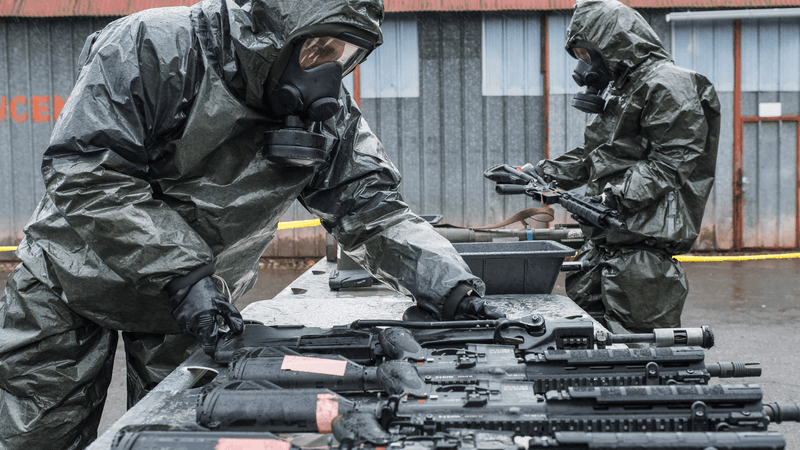The destruction of the world’s last declared chemical weapons marks a monumental milestone, not only in global disarmament efforts but also within the framework of Bahá’í teachings that advocate for peace, unity, and the elevation of humanity. The convergence of these events prompts a broader examination of how Bahá’í principles can guide us in the aftermath of such significant strides in toxic weapons eradication.
The Bahá’í Faith espouses the notion of the oneness of humankind, a central tenet that posits that all people are interconnected and share a common destiny. This belief provides a compelling backdrop against which the success of disarming chemical arsenals can be celebrated. The recent achievement serves as a clarion call for individuals, communities, and nations to reevaluate their perceptions of security, shifting from a posture of fear and aggression to one rooted in collaboration and mutual respect.
Antithetical to the idea of unity is the proliferation of weapons of mass destruction, which stands as a testament to humanity’s propensity for discord. The Bahá’í teachings, with their profound advocacy for disarmament, highlight the imperative to dismantle such instruments of violence. The destruction of chemical weapons exemplifies a tangible step toward the fulfillment of these ideals, demonstrating mankind’s capacity for rational discourse and collective action. These principles can guide ongoing efforts toward achieving lasting peace.
Furthermore, the collaborative nature of this disarmament effort mirrors the Bahá’í precept of consultation. By encouraging open dialogue among nations, the process of dismantling these weapons required engaging a variety of stakeholders in a search for common ground. This illustrates how Bahá’í principles can inform practical approaches to current global challenges. Through collaboration, nations can work to foster equitable relationships, addressing the underlying grievances that often lead to conflict.
Moreover, the core Bahá’í principle of justice serves as a foundation for post-disarmament initiatives. The eradication of chemical weapons not only fulfills a moral obligation but also underscores the necessity of ensuring that adequate support structures are implemented for affected communities. This involves comprehensive strategies centered on rehabilitation, education, and economic development. The teachings encourage us to view justice as a multidimensional construct—one that encompasses not just legal measures but social and economic dimensions as well.
In the context of environmental sustainability, Bahá’í teachings advocate for the protection of the environment as a communal responsibility. The destruction of chemical weapons significantly mitigates the risk of environmental degradation associated with their use. The potential for ecological calamity—a vital concern in the realm of international human rights—demands urgent and deliberate action. The Bahá’í emphasis on stewardship over the planet encourages a holistic approach to rebuilding ecosystems that have been compromised by militarization and pollution.
Additionally, the Bahá’í views on the importance of education are particularly salient. Identifying the interrelatedness of various global issues, the belief system asserts that education is the linchpin for fostering a culture of peace. The implications of disarming chemical weapons extend beyond immediate safety concerns; they invite a renewed focus on educating for peace. This can be realized through instilling values of coexistence and mutual benefit among future generations, nurturing individuals who see themselves as instruments of harmony rather than agents of destruction.
Expanding upon this educational framework, the Bahá’í teachings espouse the necessity of empowering women and marginalized groups within the disarmament dialogue. The engagement of diverse voices in these conversations not only strengthens democratic processes but also enriches the collective wisdom of humanity. Involving different segments of society can accelerate the progress towards comprehensive disarmament, ensuring that the remedies applied are equitable and enduring.
As we examine this pivotal juncture of disarmament, the Bahá’í emphasis on the need for spirituality in governance becomes increasingly relevant. The authentic spirit of cooperation that arose during the disarmament process reflects a shared recognition of our collective humanity. This illustrates how spiritual principles can provide the moral compass needed to guide policy decisions that safeguard future generations from the scourge of chemical weapons and other forms of violent conflict.
In conclusion, the destruction of the world’s last declared chemical weapons signals not merely an operational victory but an opportunity to reframe our collective aspirations towards peace and justice as outlined in the Bahá’í teachings. Embracing our interconnectedness, prioritizing justice, advocating for environmental stewardship, and promoting education are pivotal steps as we navigate the complexities of post-disarmament realities. As we celebrate this achievement, let it catalyze an ongoing commitment to creating a world where cooperation and mutual understanding prevail over division and violence, encapsulating the essence of the Bahá’í vision for a united humanity.
